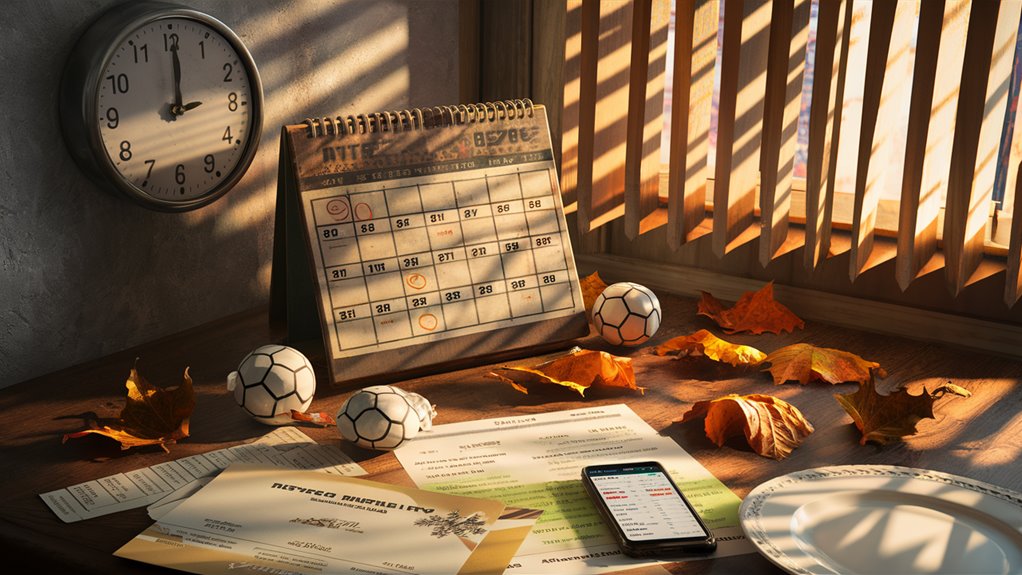How to Spot Gambling Triggers

Knowing Emotional and Behavioral Triggers
Feelings play a big part in causing urges to gamble. Look out for signs of stress, worry, sadness, or boredom that often come before gambling starts. Many people feel a strong need to gamble when they are upset or want a thrill.
Social and Place-Based Risks
Peer pressure shows up through:
- Friends who gamble a lot
- Work betting groups
- Sports viewing parties
- Social media about gambling
Place triggers include:
- Casinos and gambling shops
- Sports bars with bet screens
- Online gambling ads
- 먹튀검증 순위
- Phone betting app alerts
- Lottery tickets on show
Money Warning Signs
Keep an eye on these key money signs:
- Always checking bank amounts
- Secret buys from family
- Many ATM uses
- Money moves that can’t be explained
- Too focused on payday
Time-Based Patterns
Track urges related to specific time triggers:
- When you get paid
- Weekend plans
- Big sports games
- Holiday times
- Late at night
Online and Media Triggers
Look out for web gambling triggers:
- Ads aimed at you
- Email deals
- Social media betting posts
- Game live streams
- Sports betting apps
Knowing these personal triggers helps make good plans to stop and stronger ways to control urges to keep gambling in check.
Feelings and Gambling Actions
Knowing Emotional Triggers in Gambling Actions
How Feelings Affect Gambling Choices
Feelings deeply change how we act when gambling and make choices.
Good and bad feelings can cause a need to gamble, often without us knowing.
Fear, sadness, and being alone push people to gamble to run away, while joy and sureness may lead to taking more risks when gambling.
Big Emotional Triggers in Problem Gambling
Stress is a key thing that causes gambling actions.
Money worries, issues in relationships, and problems at work can make gambling urges stronger as people look for quick fixes or a break from stress.
Also, boredom and being alone are big risks, along with feelings of less worth and being stuck.
Finding and Handling Emotional Triggers
Keeping Track of Moods
Having a deep mood tracking journal is key to understanding what causes your gambling urges.
Writing down feelings before, during, and after gambling shows important behavior patterns.
This careful tracking lets us see if gambling needs grow during times of:
- Emotional pain
- High stress
- Too much sureness
- Being alone
Making Good Ways to Deal
Knowing personal emotion triggers lets us make new ways to handle them.
When these feelings show up, using good responses and finding the right support is key to keep gambling under control.
Social Pressure and Friends’ Impact
Knowing Social Pressure and Gambling Actions
How Friends Change Gambling Choices
Being with others and friend ties really shape gambling actions, making a web of push that can make betting issues worse or better.
When friend groups often gamble, there is a lot of pressure to join, from organized bets, casino trips, to casual gambling times.
Seeing Soft Pressure Ways
Social pressure comes in many soft ways:
- Easy asks to join betting events
- Group bets
- Work betting pools
- Challenges on social media about gambling
- Friends asking to go to casinos
Common Pressuring Words and Times
High-chance social times often have these words:
- “Don’t be the only one out”
- “All are doing it”
- “Just this once”
- “It’s just a small bet”
- “You’re missing fun”
Making Good Stand Plans
New Social Activities
- Fun without gambling
- Sport and fun acts
- Cultural events and trips
- Group fitness fun
- Community service
Laying Down Clear Lines
- Set firm personal gambling stops
- Tell limits clearly
- Keep the same answer to gambling asks
- Find support in friends who don’t gamble
- Know how to say no strongly
Building Good Friend Ties
Focus on making ties that back good acts:
- Look for friends who back your choices
- Join in big fun without bets
- Make chances to meet without gambling
- Make ties in places without gambling
- Grow ties based on what we all value
Money Worries Warning Signs
Money Stress Warning Signs: Seeing Gambling Triggers

Early Warning Points
Money trouble can make gambling triggers worse, starting a bad cycle of trying to win back losses.
Key warning signs are always checking bank amounts, hard times with basic bills, and getting loans for must-have costs.
These red flags need quick spotting and help.
Changes in How We Handle Money and Risk Points
Watch for big changes in how we manage money that often come before going back to gambling:
- Secret buys from family
- Selling things for fast money
- Thinking of getting payday loans
- Too much time spent planning possible gambling wins
Severe Warning Points
Big money trouble shows through many high-risk acts:
- Not taking care of money duties
- Avoiding people we owe money to
- Big worry about money
- Seeing gambling as a money fix
- Getting into more debt
Help and Support
When facing these warning signs, acting fast is key. Talk to:
- Money advice people
- Support groups for gambling
- Debt managing pros
- Mind health helpers
Taking steps before triggers get worse helps keep money safe and you well.
Places and Spots That Cause Gambling
Knowing Places and Spots That Cause Gambling Needs
Spots That Cause Gambling
Triggers from places can come from spots that seem okay, staying strong even years after stopping gambling.
Usual trigger spots include:
- Stores
- Hotels
- Sports bars
- Casinos
- Lottery sellers
These place cues can quickly start deep analysis strong gambling needs, making it hard to stop even years after you’ve stopped gambling.
Triggers from Senses and Feelings
Cues from the environment often start strong mind reactions:
- Sound triggers: Slot machine sounds, shuffling cards, certain music
- Sight triggers: Bright casino lights, ads for gambling, lottery signs
- Feel triggers: Crowd joy, casino vibes, energy on the game floor
Handling Place Triggers
Plans to Stop
- Find new ways to go to avoid trigger spots
- Know your personal trigger zones in your day-to-day
- Make early warning plans for when you can’t avoid these spots
Ways to Cope
- Bring friends when going to these spots
- Keep emergency contacts ready to call
- Do grounding moves:
- Focus on calm breathing
- Think of your goals to recover
- Plan fast ways to leave when needed
Keeping Up Recovery
- Write about trigger spots in your recovery journal
- Make safe travel plans for day-to-day
- Set up trigger response plans with your support group
- Watch how you feel about cues from places
Time and Seasons Affect Gambling
Knowing Time and Season Gambling Patterns
Daily and Seasonal Timing Triggers
Needs to gamble often follow clear timing patterns that can bigly change how well you recover.
Many people feel a stronger need to bet at certain times:
- After work
- Weekends
- When getting paid
- Late at night
Seasons Changing Gambling Actions
Seasonal shifts make clear patterns in gambling through the year. Key times with more risk include:
- Winter months with more time inside
- Big sports events (March Madness, Super Bowl)
- Holiday times with more free time
- Seasonal low moods affecting how open we are
Dealing with Time Triggers
Finding Triggers
Tracking your own time triggers with detailed notes helps find times with more risk. Watch your gambling needs during:
- Specific hours of the day
- Certain days of the week
- Season changes
- Special times or parties
Plans to Prevent
Use clear plans during known high-risk times:
- Plan other fun activities
- Get help from friends ahead of time
- Pick places without gambling
- Make good ways to cope
- Set a fixed daily plan
Knowing these timing patterns helps manage recovery better and stay strong during risky times.
Keeping an eye on and planning around time triggers greatly helps keep gambling under control over the long term.
Final Thoughts
How to Spot Gambling Triggers
Seeing gambling triggers is key to keep your recovery and stop a relapse. Here’s a full guide to finding and dealing with these important warning signs.
Emotional Triggers
Deep feelings often start strong gambling needs. Watch for:
- Stress and worry
- Sadness or being alone
- Joy or too much sureness
- Boredom or feeling uneasy
Situational Factors
Places and times that can make you want to gamble:
- Ads for casinos
- Sports betting ads
- Web gaming sites
- Social media posts about gambling
Money Pressure Points
Money situations that might make you gamble:
- Times to pay bills
- Unexpected bills
- When payday is near
- Getting unexpected money
Social Settings
Times with others that could make you gamble:
- Friends who gamble
- Work betting groups
- Special times or parties
- Holiday times
Time-Based Patterns
Specific times when you might feel a stronger need to gamble:
- Nights on weekends
- Big sports games
- When you get money
- In times of big life stress
Plans to Prevent
Use these plans to keep safe:
- Write down trigger times in a journal
- Find new ways to cope
- Put blocking apps on devices
- Make a group of supporters
- Go to therapy often
Help from pros and trusted friends stays key to handle gambling triggers well.
